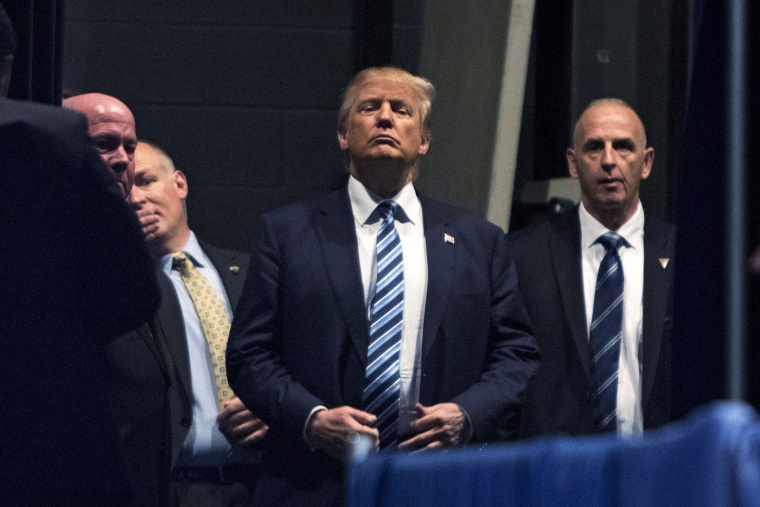It’s been a week of eye-popping statements and occasional stabs at clarification for Republican presidential front-runner Donald Trump, after his calls for greater surveillance on Muslims in the U.S. provoked intense criticism from civil libertarians and drawn comparisons to tactics used in Nazi Germany.
As with many of Trumps controversial comments, however his clarifications have often brought more confusion -- his businessman’s style of keeping options open and responding that he’ll “look into” various issues having become a trademark of the campaign.
Since the November 13 attacks in Paris that killed at least 130 people and wounded hundreds more, Trump has gone further than any of his 2016 rivals, calling for – and then at times appearing to walk back – measures steeped in racial and religious profiling he insists are necessary to keep Americans safe.
It began last Monday on MSNBC’s "Morning Joe," when Trump reignited a discussion about closing mosques – something he’d been asked about in October but which drew addition headlines for in the aftermath of the Paris bombing attack.
In October the real estate mogul told Fox Business News he would consider a proposal of closing some mosques, along with revoking the passports of some Americans who had gone abroad to fight and train with ISIS.
RELATED: Trump repeats claim that ‘thousands’ of US Arabs cheered on 9/11
“I think that’s great,” Trump said at the time about closing mosques. He conceded then that he didn’t know if he could close a mosque, but “You’re certainly going to have to look at it.”
On the phone to "Morning Joe," Trump’s rhetoric was more definite: “You’re going to have to watch and study the mosques because a lot of talk is going on at the mosques … I would hate to do it but it’s something that you’re going to have to strongly consider because some of the ideas and hatred, the absolute hatred, is coming from these areas.”
Trump cited New York City as an example, where law enforcement agencies have acknowledged monitoring mosques in the wake of the September 11, 2001 attacks.
Then, Thursday, Trump spoke with Yahoo News on the issue of tracking Muslims through databases. “We’re going to have to do things that we never did before,” he said. When asked if such measures could include a database or registry based on religion, Trump said, “We’re going to have to look at a lot of things very closely. We’re going to have to look at mosques.”
In Iowa later that night, Trump touched off a further firestorm when pressed by NBC News on whether there should be a database system to track Muslims in the United States.
“I would certainly implement that. Absolutely,” Trump told NBC News in a televised exchange.
Facing considerable blowback, Trump said he thought he’d been asked about the wall on the U.S. border with Mexico -- an issue that has been the cornerstone of Trump’s campaign from its conception.
On Friday, Trump took to Twitter to distance himself from his database comments: “I didn’t suggest a database – a reporter did.”
Finally, at a rally on Saturday in Birmingham, Alabama, Trump offered an in-person clarification. He explained that he was originally “referring to the wall, but database is OK. And watch list is OK. And surveillance is OK.”
He continued: “If you don’t mind, I want to be, I want to surveil. I want surveillance of these people that are coming in, the Trojan horse, I want to know who the hell they are.”
He also restated a claim – long disputed – that Arab Americans in New Jersey had cheered while watching the twin towers fall on 9/11.
“I watched when the World Trade Center came tumbling down,” Trump said. “And I watched in Jersey City, New Jersey, where thousands and thousands of people were cheering as that building was coming down. Thousands of people were cheering.”
On Sunday he was challenged anew on the veracity of that claim on ABC’s "This Week."
“It did happen. I saw it. It was on television. I saw it,” Trump said by phone to host George Stephanopoulos, adding, “I know it might not be politically correct for you to talk about, but there were people cheering as that building came down.”
Not surprisingly, Trump’s style – both open-ended and vague – has drawn extra scrutiny, especially given his standing as the clear front-runner in a wide field of Republican White House contenders.
Yet throughout his candidacy, Trump has not been one to back away from controversy. He’s yet to apologize for a string of remarks that reporters and rivals have balked at, and his comments about mosques, refugees, and surveillance are no different. That’s what his supporters like about him, and they remain steadfast, unbothered, and usually in agreement.
